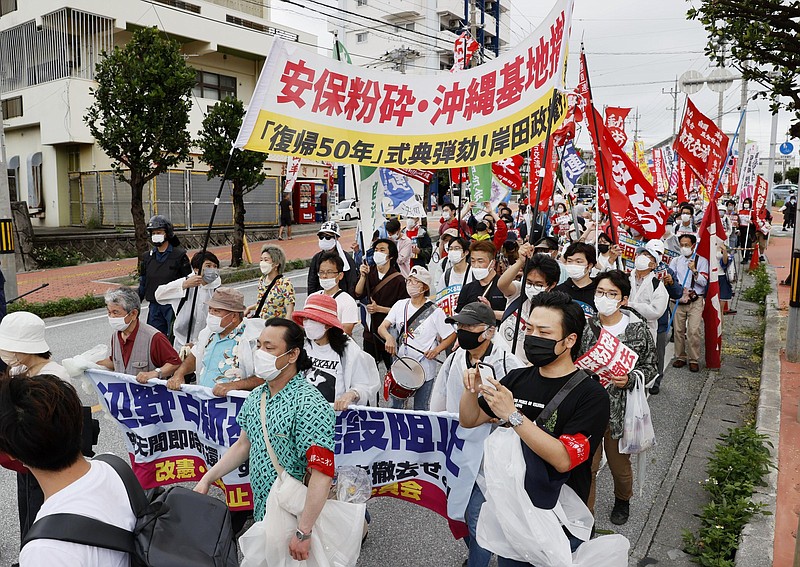TOKYO -- Okinawa Governor Denny Tamaki on Sunday urged Japan's central government to do more to reduce the U.S. military presence in the southern island group as it marked the 50th anniversary of its return to Japan after 27 years of American rule.
Tamaki said Okinawa has come a long way since the devastation of World War II and nearly three decades of U.S. rule, which ended when it reverted to Japan on May 15, 1972. But the tiny island group's yearslong demand for the mainland to share its security burden remains unresolved.
"I call on the central government to share with the entire nation the significance of Okinawa's reversion and the importance of permanent peace that Okinawans have long craved for," Tamaki said.
Ceremonies marking the anniversary were held simultaneously in two locations -- one in the Okinawan city of Giowan, home to a disputed U.S. air station, and the other in Tokyo.
Prime Minister Fumio Kishida said he takes Okinawa's concerns seriously and will make efforts to reduce the burden while still maintaining U.S. military deterrence on the islands.
Kishida and his minister in charge of the islands were in Okinawa, where hundreds of protesters staged a rally Saturday demanding a speedier reduction of U.S. military forces, as fears grow that Okinawa may become a front line of conflict amid rising China tensions.
More protests were held Sunday on Okinawa, including one in the prefectural capital of Naha, where nearly 1,000 people renewed their demands for peace.
Okinawa was the site of one of the bloodiest battles of World War II, which killed about 200,000 people, nearly half of them Okinawan residents.
Okinawa was sacrificed by Japan's imperial army to defend the mainland, and many Okinawans are skeptical that the Japanese military would protect them in future conflicts, experts say.
The U.S. military kept its troop presence on the island group for 20 years longer than most of Japan, until 1972, due to Okinawa's strategic importance for Pacific security to deter Russia and communism.
Today, a majority of the 50,000 U.S. troops based in Japan under a bilateral security pact and 70% of military facilities are still in Okinawa, which accounts for only 0.6% of Japanese land. The burden has increased from less than 60% in 1972 because unwelcomed U.S. bases were moved from the mainland.
Emperor Naruhito, in his online speech from his Tokyo palace, acknowledged "many issues" remain on Okinawa and said "I hope that the people, including the younger generation, will have a deeper understanding of Okinawa."
U.S. President Joe Biden, who is scheduled to visit Japan on Friday, praised the strong U.S.-Japan alliance and their shared values and vision.
"I am profoundly grateful for Japan's resolute support for democracy, freedom, and the rule of law and for Okinawa's contribution to advancing these ideals," Biden said in a statement.
